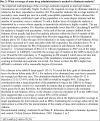Tools to accelerate falciparum malaria elimination in Cambodia: a meeting report
- PMID: 32293452
- PMCID: PMC7161105
- DOI: 10.1186/s12936-020-03197-6
Tools to accelerate falciparum malaria elimination in Cambodia: a meeting report
Abstract
Cambodia targets malaria elimination by 2025. Rapid elimination will depend on successfully identifying and clearing malaria foci linked to forests. Expanding and maintaining universal access to early diagnosis and effective treatment remains the key to malaria control and ultimately malaria elimination in the Greater Mekong Subregion (GMS) in the foreseeable future. Mass Drug Administration (MDA) holds some promise in the rapid reduction of Plasmodium falciparum infections, but requires considerable investment of resources and time to mobilize the target communities. Furthermore, the most practical drug regimen for MDA in the GMS-three rounds of DHA/piperaquine-has lost some of its efficacy. Mass screening and treatment benefits asymptomatic P. falciparum carriers by clearing chronic infections, but in its current form holds little promise for malaria elimination. Hopes that "highly sensitive" diagnostic tests would provide substantial advances in screen and treat programmes have been shown to be misplaced. To reduce the burden on P. falciparum and Plasmodium vivax infections in people working in forested areas novel approaches to the use of malaria prophylaxis in forest workers should be explored. During an October 2019 workshop in Phnom Penh researchers and policymakers reviewed evidence of acceptability, feasibility and effectiveness of interventions to target malaria foci and interrupt P. falciparum transmission and discussed operational requirements and conditions for programmatic implementation.
Keywords: Cambodia; Case detection; Forest malaria; Malaria elimination; Mass drug administration; Plasmodium falciparum; Prophylaxis; Screening and treatment.
Conflict of interest statement
The authors declare that they have no competing interests.
Figures
References
-
- Ho W. World malaria report 2019. Geneva: World Health Organization; 2019.
-
- Imwong M, Suwannasin K, Kunasol C, Sutawong K, Mayxay M, Rekol H, et al. The spread of artemisinin-resistant Plasmodium falciparum in the Greater Mekong Subregion: a molecular epidemiology observational study. Lancet Infect Dis. 2017;17:491–497. doi: 10.1016/S1473-3099(17)30048-8. - DOI - PMC - PubMed
MeSH terms
Substances
Grants and funding
LinkOut - more resources
Full Text Sources
Medical



